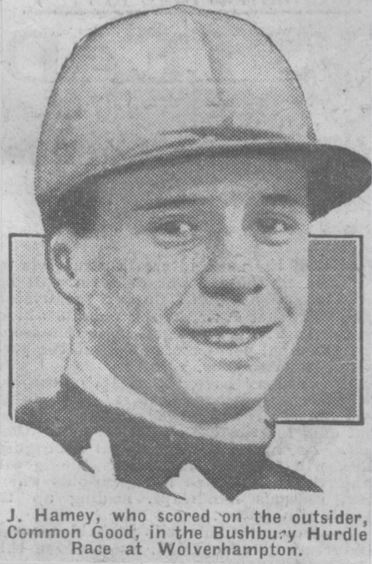Tim Hamey (1905-1993)
JOCKEY Tim Hamey was given a hero’s welcome when he returned to Grantham after winning the Grand National.
As a jockey he was renowned for being home with hurdles and steeplechase and could be relied on to get the best from his mount in the longer races.
He was born James Henry Hamey in Rutland Street, Grantham, in 1905 and attended the Boys’ Central School – which then was in the old town jail.
After leaving school at the age of 15 Hamey moved to Cheltenham to become an apprentice jockey and worked as a stable boy.
But other people at the stables were called James and so his boss decided to call him Tim instead – and it stuck for the rest of his life.
In 1926, aged 20, Hamey rode in the first his record 12 successive Grand Nationals, riding Koko, trained by Alfred Bickley.
The same year, Hamey and Koko rode to victory in the Cheltenham Gold Cup.
He also rode in the 1929 Grand National, which with 66 riders remains the largest field of all time.
But Hamey’s biggest success came in 1932 when he won the Grand National riding 50 to 1 outsider Forbra, trained by Tom Rimell. Of the 36 starters only eight completed the race.
For much of the race Hamey was alongside Edward Paget, riding Egremont, and the two were chatting away.But Hamey realised that Forbra, although wayward, was strong enough to win and left Paget behind.
Flags and bunting were put out in Alexandra Road and Hamey was swamped by autograph hunters soon after the race when he returned to Grantham to visit his parents.
By a stroke of bad luck, Hamey’s father watched him in each Grand National he rode in apart from the one he won.
Hamey was paired with Forbra again at the National the following year but could not repeat his success.
He continued to be successful – at the January meeting at Gatwick in 1935 he won three successive races.
During the war Hamey was in the Army and served in north Africa and Egypt.
When he returned to Britain he took to training horses and trained three runners in the Grand National.
He also had his fair share of winners in other races.
Hamey had two sons and one of them, Rex, followed in his father’s footsteps and became a jockey.
Grand National historian Reg Green, a friend of Hamey, said: “He was a delightful old gentleman – there was not a harmful bone in his body.”




Leave a Reply
You must be logged in to post a comment.